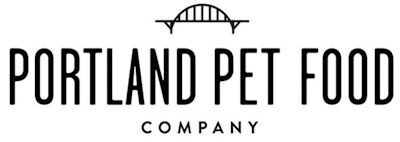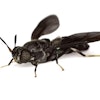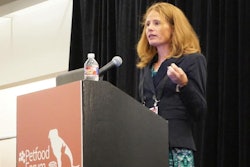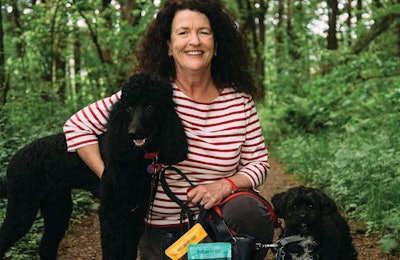
Portland Pet Food Company (PPFC), a startup founded by Kate McCarron in 2015, grew from a family’s need to feed their dog the best available options. McCarron’s then-14-year-old Standard Poodle Rosie was unable to eat traditional pet foods due to a diseased tongue, and concern for her nutritional health became the basis for PPFC’s homestyle-cooked meals and dog treats. Rosie lived to be 16-and-a-half on her new food, made with locally sourced (in the Pacific Northwest US), human-grade ingredients and without supplements, and her legacy lives on today in PPFC’s dog food.
Keying in on quality assurance and sustainability
“Our meals and treats reflect our commitment to offer the quality assurance pet parents are looking for in their pet’s food and treats,” says McCarron. “For a start-up company, our product research and development is extensive. Our nutritional knowledge and scientific background guided us to create meals and treats with limited ingredients. We worked with the Oregon Food Innovation Center to create a line of meals that follow AAFCO (the Association of American Feed Control Officials) guidelines while providing nourishment formulated for a dog, but stop short of additional supplementation. As humans, we do not add supplements to our meals, nor do we feel that it is necessary for a dog that eats natural healthy ingredients.”
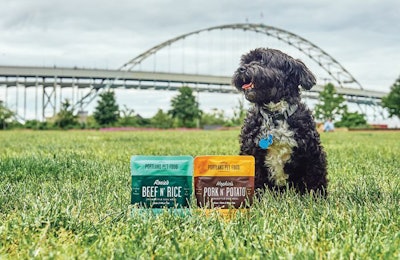
Portland Pet Food’s shelf-stable 9 oz. cooked treat meals are unique with sales to retail segments beyond traditional pet food channels, according to the company. Unlike the traditional aluminum-lined pouches, these pouches may be heated in a microwave or in a pot of water to provide a warm treat meal to dogs who are finicky eaters or elderly. | Photo by Aaron Lee
PPFC also considers sustainability to be one of its cornerstones, working with local vendors to decrease the company’s footprint on society. To that end, PPFC uses sustainable packaging for its shelf-stable microwavable pouches.
“Our new, all-natural shelf-stable meal mixers, which come in a convenient BPA-free, microwavable pouch, are an eco-friendly industry game changer,” says McCarron. “Not only are they convenient for the consumer, our pouches generate one-tenth of the CO₂ emissions and consume 25 percent of the energy it takes to create a metal can. They also occupy 30 percent less space than a similar case of cans.”
PPFC also works with local breweries to find ingredients for its new dog biscuits by repurposing spent grains.
“[One treat is] a grain- and gluten-free brew biscuit, which uses a local gluten-free brewery’s mash made of chestnuts and lentils, as opposed to traditional barley for brewing beer,” says McCarron. “We have also launched a malt biscuit using a local distillery’s mash; i.e., a ‘whiskey’ biscuit.”

Portland Pet Food has released several new dog biscuits in the last year, including a grain- and gluten-free brew biscuit which uses a local (Portland, Oregon, USA) gluten-free brewery’s mash made of chestnuts and lentils, and a malt biscuit using a local distillery’s mash; i.e., a “whiskey” biscuit. | Photo by Aaron Lee
It’s a winning strategy, according to the company, which saw its 2017 first-quarter sales more than double from Q1 2016 and has tripled production capacity since 2015.
“We have developed custom biscuits for nationally recognized businesses that wish to have co-branded dog treats for their customers,” says McCarron. “All these products, particularly the shelf-stable meal topper pouches, have experienced doubling and tripling in sales in the last year.”
National expansion and developing in international markets
PPFC’s shelf-stable treat meal mixers/toppers launch has been a major success, according to the company, and a national product expansion is underway with distributors across the United States. But the company doesn’t plan on stopping there.
“PPFC has been able to increase production of our biscuits and shelf-stable foods in our Portland facilities so we can readily meet the growing product demand without compromising quality,” says McCarron. “We are now certified to export to Canada and will complete our certification for several other countries in the next few months.”
Such ambitious growth does have its challenges, of course.
“Like many startups, we’re challenged by our rapid growth and ability to meet market interest in our products via distribution in the US and abroad,” says McCarron. But, “as a startup with less than three years in business and organic sales growing by double to triple each year, we are quite optimistic. Our inventive shelf-stable treat meals have created a foray into non-endemic possibilities in the outdoor, travel and camping sectors. We will continue to build our presence on USA distribution but expand globally.”
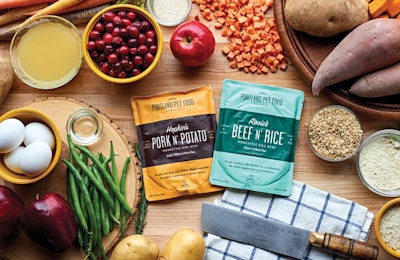
The company says it is known for using human-grade ingredients that are free of additives and supplements and sourced in the Pacific Northwest (USA). | Photo by Aaron Lee
PPFC’s focus on simplicity and keeping true to creating products with limited ingredients that are healthy and nutritious will keep the company on the road to success, says McCarron.
“We focus on our consumers’ needs,” she says. “Word of mouth and repeat customers have helped us gain recognition, as will wider distribution nationally and internationally as we have solid repeat orders from existing stores.”
Increased visibility and expansion has benefited the company in other ways, as well, allowing them to give back to the industry. PPFC donates 5 percent of net sales to organizations supporting animal welfare.
Industry outlook and the future of Portland Pet Food
PPFC’s take on the pet food industry is that it has turned its focus to more specialty food products that reflect pet owners wanting to feed their pets comparable food items that meet the same variety, taste and quality standards that they themselves expect.
“The industry faces many challenges, ranging from consumer demand for transparency in food labeling and the impact of the internet on purchasing to regulations,” says McCarron. “PPFC is well-positioned in these areas, but I think it is a growing challenge for the overall industry.”
McCarron said she thinks there will be an increasingly wide availability of human-grade food sourced and produced locally in the US, and that easy-to-handle and eco-friendly packaging will be required by consumers — all things PPFC is more than equipped to handle.
“Limited-ingredient foods will continue to prosper,” says McCarron. “The industry will need to develop and adapt to growing needs for quality foods that provide nutrition without additives and supplementation. We pride ourselves on working with local vendors and assuring all ingredients are from the USA."
“Today, stores across the country carry our treat meals as well as our nutritious treats,” she says. “We will continue to press forward in our commitment to create quality, nutritious food for dogs and owners in the US and around the world.”

